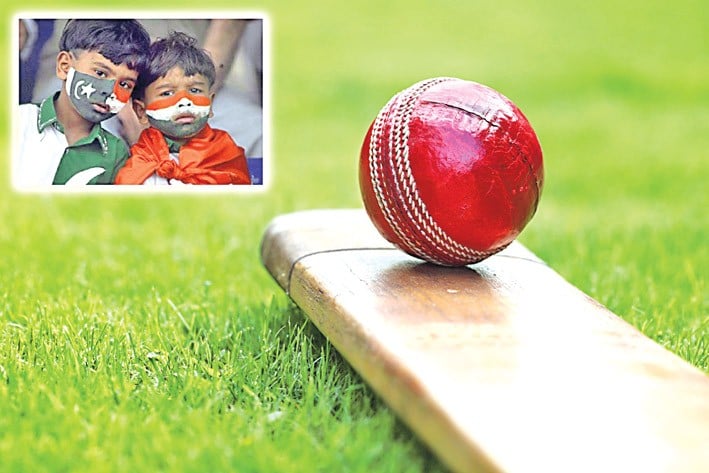
Of silly mid-ons and mid-offs that dominate the jinxed Indo-Pak series

It is entirely possible that by the time you read these lines, the jinxed Indo-Pak cricket Test series scheduled for December this year would have been all but nixed after a painstaking battle with hope.
Certainly, Prime Minister Nawaz Sharif will be hard-pressed to go against the popular sentiment in Pakistan over India’s obduracy and BCCI’s blatant breach of a signed MoU, especially after Interior Minister Chaudhry Nisar Ali Khan left no-one in any doubt about what to do on a queered pitch.
If there’s anything worse than looking up the horoscope of a much-touted revival rubber, it is the flurry of propositions and comments -- often bordering on the tame and ridiculous -- that have left the fans in a tailspin.
Consider the proposal mooted by BCCI chief Shashank Manohar for a shortened rubber of ODIs and T20s, with a string of ifs and buts.
"We are committed to playing Pakistan in December. However, since it’s not possible to play them in Pakistan or the UAE, we have to look at playing the series in Northern India in December," Manohar told The Hindu recently.
But all of this was still up in the air as he virtually conditioned it to (Indian Prime Minister Narendra) Modi’s mood.
"To play against Pakistan, we need to get government permission. So we need to speak to the government and abide by whatever decision the government takes."
Circumstantial evidence would suggest even this bit of relenting from the BCCI may be down to the PCB’s veiled threat of a boycott of next year’s T20 World Cup in India.
The PCB has so far not taken the bait on playing in India, citing security reasons and the need to consult the government should a formal -- and watered down -- proposal be made, but even that may have something to do with the strong public reaction in Pakistan over the PCB’s lily-livered approach until recently and Minister Nisar’s salvo last week.
Najam Sethi, Head of PCB’s Executive Committee, who was the chairman when he signed the MoU last year with BCCI, is now also calling for rejecting the BCCI’s offer.
The changed environment in the board follows furious calls from former PCB chief executive Arif Ali Khan Abassi and ex-captain Asif Iqbal, who questioned if Shaharyar Khan and Najam Sethi even had the basic idea of the protocol governing Future Tours Programme after the duo went to India to seek the BCCI’s response when it is the BCCI delegates that should have been visiting Pakistan.
An apparent change of heart followed when the PCB chairman warned at a presser straight after coming from the airport empty-handed from India that the board could contemplate a boycott of the T20 World Cup if the BCCI reneged on its commitment.
Read also: "BCCI making a big mistake, but boycotting T20 not an option," says Ramaswamy Mohan
The farcical developments have taken a new turn -- Shahid Afridi-style -- with the out-of-form T20 Pakistani skipper, whose last hurrah it will be, first questioning the board’s tailing of the BCCI, and now, suggesting it was fine to play the series in India as long as the Indians shared the spoils.
"I don’t know why we are pushing for a series against India again and again. I don’t see any reason to play (against India) if they don’t want to play," he told the media in Lahore in September.
"If the Indian board gives in writing they will give revenues to Pakistan if the series is held in India, than it can be done," he said last week.
So does it all boil down to money, and can the PCB really afford to skip the World T20 beat?
Former Indian pacer Atul Wassan, a regular on Geo’s Takra show whenever the two sides meet, warns a boycott would only hurt Pakistan.
"I think that will be counterproductive and only Pakistan will stand to lose by it. As all and sundry know, it’s not the BCCI, but the times we live in (that) is dictating terms. So no point sulking over the BCCI and not playing the World Cup. Only Pakistan cricket and cricketers will stand to lose," Wassan told ‘The News on Sunday’.
However, Wassan does not think the dead-end has been quite reached yet, suggesting political will can still retrieve lost ground.
"If the (Indian) government decided to thaw relations by giving signals to use cricket diplomacy again, you never know the series might be fast tracked," he reckoned.
Meanwhile, even as a nonplussed PCB contemplates what next -- after Sethi as chief last year led the naysayers in Pakistan to believe an MoU signed with the BCCI for six series in return for sealing the ICC’s New World Order would boost the PCB’s financial health -- the ICC, under a Pakistani figurehead, remains just as toothless.
"What is the meaning of bilateral? If both the countries decide then only it will happen, otherwise it won’t and ICC cannot do anything," honourary ICC president Zaheer Abbas said in August in response to a question about the world governing body’s role.
While Abbas’s take could be likened to President Barack Obama’s familiar shrug on the unresolved Kashmir issue -- with bilateral cricket serving as the allegory in this instance -- the fans can only hope, jokes aside, that somehow, in the end, better sense will prevail.